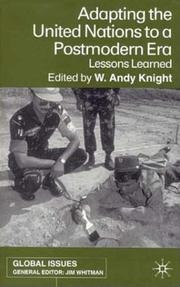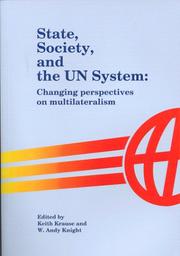| Listing 1 - 8 of 8 |
Sort by
|

ISBN: 0333801512 Year: 2000 Publisher: Houndmills, UK : Palgrave,
Abstract | Keywords | Export | Availability | Bookmark
 Loading...
Loading...Choose an application
- Reference Manager
- EndNote
- RefWorks (Direct export to RefWorks)

ISBN: 0333801504 9781403917157 1403917159 9780333801505 Year: 2005 Publisher: Basingstoke Palgrave Macmillan
Abstract | Keywords | Export | Availability | Bookmark
 Loading...
Loading...Choose an application
- Reference Manager
- EndNote
- RefWorks (Direct export to RefWorks)
Postmodernism. --- Postmodernisme --- United Nations. --- 822.1 Verenigde Naties --- 255.1 Verenigde Naties --- Postmodernism --- Post-modernism --- Postmodernism (Philosophy) --- Arts, Modern --- Avant-garde (Aesthetics) --- Modernism (Art) --- Philosophy, Modern --- Post-postmodernism --- UN --- UNO --- Polemology --- United Nations --- Naciones Unidas --- Nations Unies --- ONU --- Organisation des Nations Unies --- Organizat︠s︡ii︠a︡ Obʺedinennykh Nat︠s︡iĭ --- OON --- Vereinigte Nationen --- Umot ha-meʼuḥadot --- Organizacja Narodów Zjednoczonych --- ONZ --- Forente nasjoner --- Forenede nationer --- FN --- Förenta nationerna --- Gaertʻianebuli erebi --- Organização das Nações Unidas --- PBB --- Perserikatan Bangsa-Bangsa --- Kokusai Rengō --- Kokuren --- ENSZ --- Egyesült Nemzetek Szövetsége --- Birleșmiș Milletler Teșkilâtı --- Birlăşmiş Millătăr Tăşkilatı --- Birlashgan Millatlar Tashkiloti --- BMT --- YK --- Yhdistyneet kansakunnat --- OUN --- Organizacija Ujedinjenih Nacija --- NU --- Nazioni Unite --- OSN --- Organizace spojených národů --- Sāzmān-i Milal-i Muttafiq --- Bangsa² Bersatu --- Organización de las Naciones Unidas --- Ühinenud Rahvaste Organisatsioon --- ÜRO --- Organismos tōn Hēnōmenōn Ethnōn --- Umoja wa Mataifa --- Vereinten Nationen --- Vereinte Nationen --- Hayʼat al-Umam al-Muttaḥidah --- Verenigde Naties --- VN --- Organizația Națiunilor Unite --- Um --- Lien ho kuo --- OKB --- Organizata e Kombeve të Bashkuara --- Lian he guo --- U.N. --- Umam al-Muttaḥidah --- OĒE --- Hēnōmena Ethnē --- Organizácia Spojených Národov --- Sahaprachāchāt --- Națiunile Unite --- Organizat︠s︡ii︠a︡ na obedinenite nat︠s︡ii --- Organismos Hēnōmenōn Ethnōn --- Manẓūmat al-Umam al-Muttaḥidah --- AAN --- Arhanizatsyi︠a︡ Ab'i︠a︡dnanykh Natsyĭ --- Nações Unidas --- Orhanizat︠s︡ii︠a︡ Ob'i︠e︡dnanykh Nat︠s︡iĭ --- O.Ē.E. --- ʻOngkān Sahaprachāchāt --- Sjuninejal Konob'laq --- Sāzmān-i Milal-i Muttaḥid --- Milal-i Muttaḥid --- Nėgdsėn U̇ndėstniĭ Baĭguullaga --- NUB --- Rāshṭrasaṃgha --- או״מ --- أمم المتحدة --- الأمم المتحدة --- سازمان ملل متحد --- 国際連合 --- 联合囯 --- 聯合國 --- United Nations Organization --- Liên Hiệp Quó̂c --- Liên Hợp Quó̂c --- LHQ --- Kula Samagga --- YūʼAṅʻnʻ --- 联合国 --- Организация на обединените нации --- Организация Объединённых Наций

ISBN: 9280811010 Year: 2004 Publisher: Edmonton University of Alberta Press
Abstract | Keywords | Export | Availability | Bookmark
 Loading...
Loading...Choose an application
- Reference Manager
- EndNote
- RefWorks (Direct export to RefWorks)
Peace-building. --- Conflict management --- Consolidation de la paix --- Gestion des conflits --- Developing countries --- Pays en développement --- Politics and government. --- Politique et gouvernement --- #SBIB:327.5H20 --- #SBIB:044.AANKOOP --- Vredesonderzoek: algemeen --- Peace-building --- Pays en développement --- Building peace --- Peacebuilding --- Peace --- Peacekeeping forces

ISBN: 0585098018 9780585098012 9280808850 9789280808858 Year: 1995 Publisher: Tokyo United Nations University Press
Abstract | Keywords | Export | Availability | Bookmark
 Loading...
Loading...Choose an application
- Reference Manager
- EndNote
- RefWorks (Direct export to RefWorks)
World politics --- International relations --- International Cooperation --- International Law --- Law, Politics & Government --- Congresses --- United Nations --- Congresses. --- UNO --- Naciones Unidas --- Nations Unies --- ONU --- Organisation des Nations Unies --- Organizat︠s︡ii︠a︡ Obʺedinennykh Nat︠s︡iĭ --- OON --- Vereinigte Nationen --- Umot ha-meʼuḥadot --- Organizacja Narodów Zjednoczonych --- ONZ --- Forente nasjoner --- Forenede nationer --- FN --- Förenta nationerna --- Gaertʻianebuli erebi --- Organização das Nações Unidas --- PBB --- Perserikatan Bangsa-Bangsa --- Kokusai Rengō --- Kokuren --- ENSZ --- Egyesült Nemzetek Szövetsége --- Birleșmiș Milletler Teșkilâtı --- Birlăşmiş Millătăr Tăşkilatı --- Birlashgan Millatlar Tashkiloti --- BMT --- YK --- Yhdistyneet kansakunnat --- OUN --- Organizacija Ujedinjenih Nacija --- UN --- NU --- Nazioni Unite --- OSN --- Organizace spojených národů --- Sāzmān-i Milal-i Muttafiq --- Bangsa² Bersatu --- Organización de las Naciones Unidas --- Ühinenud Rahvaste Organisatsioon --- ÜRO --- Organismos tōn Hēnōmenōn Ethnōn --- Umoja wa Mataifa --- Vereinten Nationen --- Vereinte Nationen --- Hayʼat al-Umam al-Muttaḥidah --- Verenigde Naties --- VN --- Organizația Națiunilor Unite --- Um --- Lien ho kuo --- OKB --- Organizata e Kombeve të Bashkuara --- Lian he guo --- U.N. --- Umam al-Muttaḥidah --- OĒE --- Hēnōmena Ethnē --- Organizácia Spojených Národov --- Sahaprachāchāt --- Națiunile Unite --- Organizat︠s︡ii︠a︡ na obedinenite nat︠s︡ii --- Organismos Hēnōmenōn Ethnōn --- Manẓūmat al-Umam al-Muttaḥidah --- AAN --- Arhanizatsyi︠a︡ Ab'i︠a︡dnanykh Natsyĭ --- Nações Unidas --- Orhanizat︠s︡ii︠a︡ Ob'i︠e︡dnanykh Nat︠s︡iĭ --- O.Ē.E. --- ʻOngkān Sahaprachāchāt --- Sjuninejal Konob'laq --- Sāzmān-i Milal-i Muttaḥid --- Milal-i Muttaḥid --- Nėgdsėn U̇ndėstniĭ Baĭguullaga --- NUB --- Rāshṭrasaṃgha --- או״מ --- أمم المتحدة --- الأمم المتحدة --- سازمان ملل متحد --- 国際連合 --- 联合囯 --- 聯合國 --- United Nations Organization --- Liên Hiệp Quó̂c --- Liên Hợp Quó̂c --- LHQ --- Kula Samagga --- YūʼAṅʻnʻ --- 联合国 --- Организация на обединените нации --- Организация Объединённых Наций
Book
ISBN: 1487510128 9781487510121 9781487520045 1487520042 9781487500078 1487500076 1487510136 Year: 2018 Publisher: Toronto : University of Toronto Press,
Abstract | Keywords | Export | Availability | Bookmark
 Loading...
Loading...Choose an application
- Reference Manager
- EndNote
- RefWorks (Direct export to RefWorks)
"As media coverage of terrorism and terroristic acts has increased so too has the discussion about the identities, motives, and gender of the perpetrators. Over the past fifteen years, there have been over 150 reported suicide bombings committed by women around the world. Because of its prominence in media reporting, the phrase "female suicide bomber" has become loaded with gendered notions and assumptions that elicit preconditioned responses in the West. Female Suicide Bombings critically examines and challenges common assumptions of this loaded term. Tanya Narozhna and W. Andy Knight introduce female suicide bombings as a socio-political practice and a product of deeply politicized, gendered representations. Drawing on a combination of feminist and post-colonial approaches as well as terrorism studies literature, the authors seek to transcend ideological divisions in order to enhance our understanding of how gender, power, and academic practices influence our perceptions of female suicide bombings."--
Women suicide bombers. --- Women terrorists. --- Terrorism --- Feminism. --- Emancipation of women --- Feminist movement --- Women --- Women's lib --- Women's liberation --- Women's liberation movement --- Women's movement --- Social movements --- Anti-feminism --- Female offenders --- Terrorists --- Suicide bombers --- Women terrorists --- Social aspects. --- Political aspects. --- Emancipation --- Women suicide bombers --- Feminism --- Social aspects --- Political aspects --- E-books
Book
ISBN: 9780754671824 9780754691631 0754671828 0754691632 9781315613406 9781317042112 9781317042129 Year: 2009 Publisher: Farnham Ashgate
Abstract | Keywords | Export | Availability | Bookmark
 Loading...
Loading...Choose an application
- Reference Manager
- EndNote
- RefWorks (Direct export to RefWorks)
Discussing the major theories of political leadership with a focus on contemporary challenges that political leaders face worldwide, this research companion provides a comprehensive and up-to-date resource for an international readership. The editors combine empirical and normative approaches to emphasize the centrality of political culture, as well as the limits of culture and the universal demands of innovative adaptation.
Political leadership --- Political leadership. --- #SBIB:324H41 --- 316.46 --- Leadership --- Politieke structuren: elite --- Gezag. Leiderschap. Macht --- Political Science --- Political Theory of the State --- Law, Politics & Government --- 316.46 Gezag. Leiderschap. Macht --- Political sociology
Book

ISBN: 9781685851729 168585172X Year: 2023 Publisher: Boulder
Abstract | Keywords | Export | Availability | Bookmark
 Loading...
Loading...Choose an application
- Reference Manager
- EndNote
- RefWorks (Direct export to RefWorks)
The results of more than fifty years of peacekeeping operations—ranging from diplomatic efforts to so-called peace enforcement (the use of military force)—have made it clear that a new international political capability is required to adequately manage internal conflicts. That capability, peace- maintenance, is introduced and explored in this seminal work. Varying in degree of engagement between governorship, control, partnership, and assistance, peace- maintenance is conceived as an interim authority that, in conjunction with local populations, represents the exercise of political authority within nations by the international community as a whole. The authors at once debate the legitimacy and effectiveness of peace-maintenance and clearly explain the dimensions and requirements of successful operations. Theoretical doctrine and practical experience are integrated in chapters on establishing political authority, organizing civil administration, reestablishing law and order, asserting humanitarianism, providing military security, and local acceptance of external authority. The result is both a review of past missions and a dialogue about the current and future politics of peace-maintenance.
Digital

ISBN: 9781685851729 9781555877569 Year: 2023 Publisher: Boulder Lynne Rienner Publishers
Abstract | Keywords | Export | Availability | Bookmark
 Loading...
Loading...Choose an application
- Reference Manager
- EndNote
- RefWorks (Direct export to RefWorks)
| Listing 1 - 8 of 8 |
Sort by
|

 Search
Search Feedback
Feedback About UniCat
About UniCat  Help
Help News
News